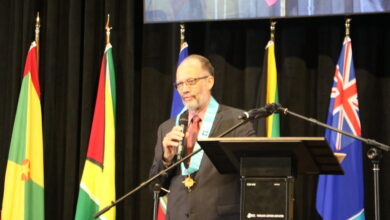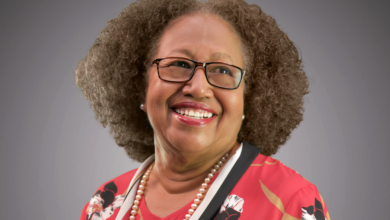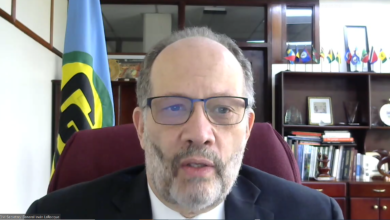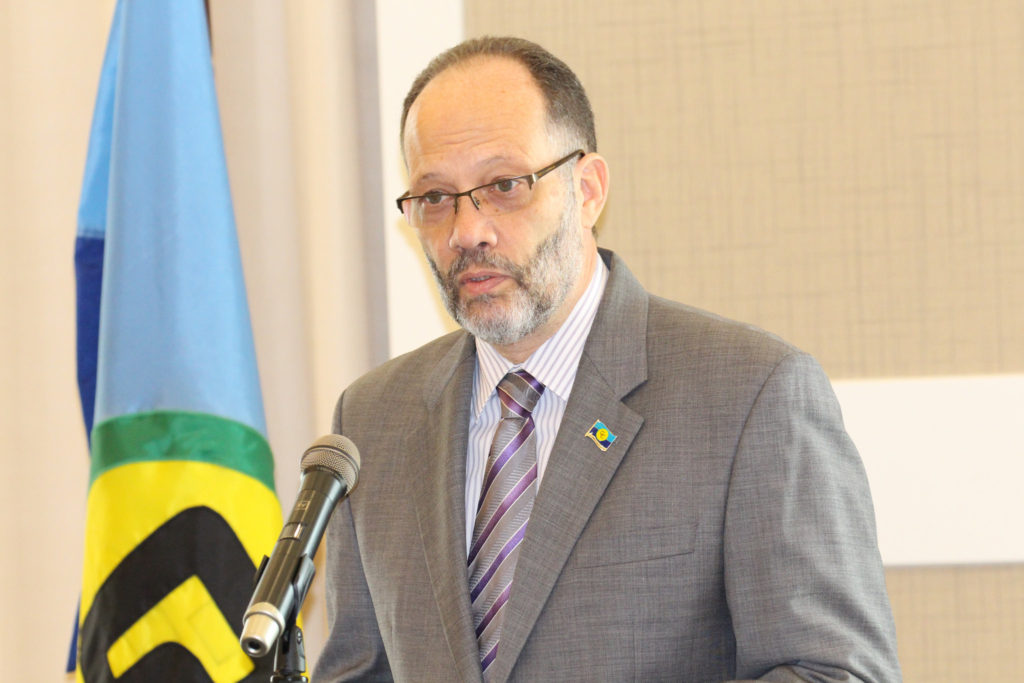REMARKS
BY THE
SECRETARY-GENERAL
AMBASSADOR IRWIN LAROCQUE
on the occasion
of
the FORTY-SECOND REGULAR MEETING OF THE CONFERENCE OF
HEADS OF GOVERNMENT OF
THE CARIBBEAN COMMUNITY
VIA videoconference
5-6 July 2021
- Honourable Gaston Browne, Prime Minister of Antigua and Barbuda and Chairman of the Conference of Heads of Government of the Caribbean Community;
- Dr. the Honourable Keith Rowley, Prime Minister of Trinidad and Tobago and Outgoing Chairman;
- Your Excellencies, Heads of State and Government of the Caribbean Community;
- Other Heads of Delegation;
- Dr. Carla Barnett, Secretary-General Designate;
- Heads of Regional and International Institutions;
- Delegates;
- People of the Caribbean Community.
I welcome you all to the Forty-Second Regular Meeting of the Conference of Heads of Government of the Caribbean Community (CARICOM). Unfortunately, as has become the norm since March of last year, we cannot meet in person as this destructive COVID-19 virus continues to disrupt our lives.
I know that our new Chairman, Prime Minister Gaston Browne would have loved to greet his colleagues in beautiful Antigua and Barbuda, but the current circumstances do not allow.
Not being together in one place does not, however, prevent us from welcoming the new Premiers of the Cayman Islands, and the Turks and Caicos Islands, the Honourable Wayne Panton and the Honourable Charles Misick to their first Meeting of the Conference. Congratulations Premiers and we look forward to your contributions to the deliberations.
Over the last six months, our Community has been led astutely by Dr. the Honourable Keith Rowley, the Prime Minister of Trinidad and Tobago. His commitment to his role has brought tangible results for our Member States.
He undertook a significant amount of vaccine advocacy on behalf of the Community, the results of which should be arriving in Member States in the coming weeks.Thank you, Prime Minister, and for the guidance that you provided me during your tenure.
We meet today in the aftermath of Hurricane Elsa which affected six Member States, including loss of life. I extend my condolences to the family of the deceased in Saint Lucia. This follows the very recent severe flooding in Guyana and Suriname. There has been widespread damage to housing, agriculture and infrastructure.
And St. Vincent and the Grenadines had to contend with Elsa while still dealing with the La Soufrière volcano.
The vulnerability of our Member States can never be in doubt. At times like this, the true spirit of our Community is demonstrated as Member States are always the first responders.
Mr. Chairman, Heads of Government, as we mourn the continuing loss of life and count the cost of lost livelihoods from the COVID-19 pandemic, we must design a recovery that will not only resuscitate our economies but also enhance the resilience of our Community.
It is our duty to fortify our Community against the factors that threaten its viability and the sustainable well-being of our people. That is the priority which not only has brought us here at this time, but which is the driving force of our integration movement.
It is also the priority that has engaged me as Secretary-General over the past decade, along with making the integration movement a lived experience for the citizens of CARICOM.
To help achieve this, we have embarked on much needed Community Reform. This task has been guided in large measure by the Community’s first-ever Strategic Plan, which is built on the resilience model. The execution of the Plan has been entrusted to three Implementing Partners, the Member States, the Regional Institutions and the CARICOM Secretariat.
This has ensured a greater level of cohesion and coordination in the work of the Community with a Results-Based Management System putting the premium on delivering results and accountability.
The involvement of the stakeholders at the national and regional levels has also been pursued with the engagement of the private sector, labour, civil society and the youth. Their voices are now heard around the table at our Ministerial Councils, and in the case of the private sector, labour and civil society, they have been welcomed again to the forum of the Heads of Government.
I have been energised by the vitality and ideas of our youth with whom I have interacted throughout my tenure. I have been struck by their immense pride in being part of the Caribbean Community and their desire for integration to work for them.
It is to provide them with the tools to fulfil their ambitions that the Human Resource Development Strategy 2030 was devised. That Strategy, and its accompanying Action Plan, provides for a globally competitive, innovative and seamlessly integrated education system to drive inclusive sustainable development in our Region.
A major vehicle driving that development is the CARICOM Single Market and Economy (CSME). A lot of time and effort have been spent putting in place policies, programmes and systems for the private sector, labour and the overall population to benefit from the CSME.
The categories of free movement of skills have been expanded. A protocol outlining the rights of spouses and dependents who accompany the skilled worker to another Member State has been agreed.
New business opportunities have been created. A public procurement protocol opening a market estimated at 5 billion US dollars for businesses within the Member States of the CSME has been signed, and the online dashboard advertising tenders has been established.
The aviation sector has also been liberalised with the coming into force of the Multilateral Air Services Agreement. It is my expectation that as more airlines make use of this Agreement, it will allow for greater choice of movement throughout our Community and contribute, with competition, to lowering airfares.
These are but some examples of what has been put in place within the last decade for the people of our Community to be able to realise the benefits of the CSME as a lived experience.
Other steps have been made to buttress the welfare of the people of the Community. There has been progress in greater cooperation among Member States to combat crime in the Community, as well as building a legal architecture.
Three major legal instruments were agreed to in this regard. I refer to the CARICOM Arrest Warrant Treaty, the Treaty with Respect to Return and Sharing of Recovered Assets from Criminal Activity, and the Mutual Legal Assistance Treaty.
These Treaties provide the regional law enforcement and justice systems with the tools to engage those whose criminal activities respect no borders.
Mr. Chairman, I am the first to recognise that more could have been accomplished, particularly with the CSME. A lot of preparatory technical work has been done, and redone, by the Secretariat. But because of our decision-making process, we can only move as fast as the slowest Member State.
To drive the integration process forward, the time has come to consider favourably the concept of enhanced cooperation to allow those who are ready to go forward to do so. This was discussed as early as when the original Treaty of Chaguaramas was being revised. It has been referred to at various times as circles of integration or the coalition of the willing.
I believe this must be pursued. But we must maintain the integrity and fundamental principles, goals and objectives of the Revised Treaty.
We must also put greater focus on prioritising, especially bearing in mind resource constraints.
The Secretariat has had to do more with less. During my terms of office, the financial resources available to the Secretariat declined by 25 percent, due largely to a decline in donor resources, and we also experienced a resulting decline in our staff head count.
But the demands and the output of the Secretariat have not declined. As a matter of fact, they have increased.
This is due to the dedication of our staff and to the introduction of greater efficiencies in the manner in which we work. This is part of the Reform Process of the Secretariat.
An assessment of the Secretariat’s processes and systems has been undertaken. This has resulted in proposals for a redesign of its structure and business operations, some of which have been implemented. The objective is to make the Secretariat more efficient, strategic, agile and effective.
Mr. Chairman, Heads of Government, our advocacy, along with the cohesive economic, social, and security pillars that we have been building have not gone unnoticed in the wider world. CARICOM’s unified voice is much sought after by the international community. The desire to formalise links with us is growing.
It was CARICOM’s influence, co-ordination and negotiating skills, which ensured that the Paris Agreement on Climate Change included the important aim of a global temperature rise being contained below 1.5 degrees Celsius.
For us climate change is a lived reality. It fuels the urgency for us to build resilience.
This is why there is an urgent need for small vulnerable states like ours, whether low, middle or upper income, to have access to concessional development financing in order to achieve resilience prior to a disaster and not wait until after it strikes.
Our persistent advocacy on the need for a vulnerability index is receiving attention in the international community.
This underlines the value of acting in concert to achieve our goals. Time and again, we have demonstrated that when we act together the sum of our collective voices is greater than the sum of its parts.
We summoned our collective spirit to combat the effects of the COVID-19 pandemic. Without that approach, it would have been difficult to overcome the health challenges posed by the virus.
The International Monetary Fund has categorised our Region as the worst affected in the world by the pandemic. The predictions speak to a recovery by 2023 at best, and that is dependent on an immediate and adequate supply of vaccines, at least to provide herd immunity.
Our efforts at securing adequate supplies are beginning to bear fruit.
Mr. Chairman, Heads of Government, in recent times our Community has been beset by financial crises, several intense climatic events and other natural disasters, and latterly a pandemic.
However, we have emerged stronger than ever, testimony to our determination and commitment to each other, and the integration process. We have much to celebrate.
As I prepare to leave office in six weeks time, I express my heartfelt thanks to you the Heads of Government for bestowing on me the great honour of allowing me to serve you. Your unstinting support and the confidence you reposed in me was a constant source of strength during my tenure.
I must also pay tribute to the staff of the CARICOM Secretariat. These dedicated and committed public servants work tirelessly, through long hours, in their determination to ensure that integration is beneficial to the people of our Community.
I leave fully confident that the Community and its Secretariat could not be in better hands than that of my successor, Dr. Carla Barnett. Her varied experience and acknowledged expertise in regional matters and international issues of concern to the Region will be of immense benefit to Community. I wish her all success!
It has been my privilege and honour to serve the people of the Caribbean Community, and I will forever remain committed to our integration movement, and for a viable, prosperous and safe Community for all.
I thank you.






